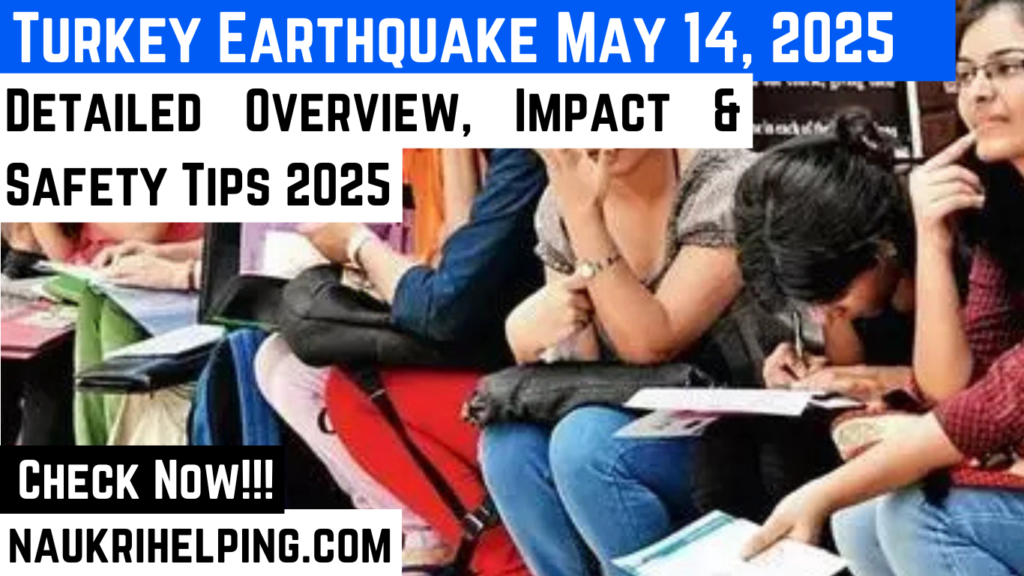📌 Introduction: Key Facts About the May 14, 2025 Earthquake in Turkey
On May 14, 2025, a moderate but significant 6.0 magnitude earthquake shook the eastern Mediterranean region. The epicenter was located near the Greek island of Kasos, a region known for its tectonic activity. The tremors were widely felt across several countries including Turkey, Greece, Egypt, Lebanon, and Jordan. This event caused temporary disruptions and raised concerns about seismic safety and preparedness in this vulnerable region.

Turkey, sitting on several active fault lines, is no stranger to earthquakes. The tremors affected multiple provinces, especially in southwestern Turkey, where several cities experienced noticeable shaking. The authorities acted swiftly to monitor the situation, issue warnings, and reassure the public.
🌍 Earthquake Location and Regional Seismicity
The earthquake’s epicenter was pinpointed in the Mediterranean Sea, about 78 kilometers deep, near the island of Kasos in Greece. This depth helped moderate the intensity of shaking experienced on the surface, reducing potential damage. However, the tremors were still widely felt in nearby Turkish provinces such as Denizli, Antalya, Isparta, and İzmir, as well as the Greek islands of Crete and Rhodes.
This region lies on a complex tectonic boundary where the African Plate subducts beneath the Eurasian Plate along the Hellenic Arc. Such geological dynamics make the eastern Mediterranean a hotspot for seismic events. Turkey itself is crisscrossed by active fault lines like the North Anatolian Fault, responsible for many historic earthquakes.
⚠️ Tsunami Warning and Emergency Response
Shortly after the earthquake, Greek authorities issued a tsunami warning for coastal areas of the southern Aegean Sea. Fortunately, after careful monitoring, no significant tsunami waves were observed, and the warning was lifted. This rapid response showcased the effectiveness of regional early warning systems.
In Turkey, the Disaster and Emergency Management Authority (AFAD) mobilized quickly. Emergency teams were dispatched to the most affected regions to assess damage and assist residents. AFAD also released public safety advisories urging caution, especially concerning possible aftershocks. Hospitals and emergency services were put on alert, ensuring readiness in case of casualties.
The quick coordination between Turkish and Greek authorities helped minimize panic and ensured a calm response.
🏛️ Turkey’s Earthquake Preparedness and Safety Measures
Turkey has made substantial progress in earthquake preparedness in recent years. Strict building codes, especially in urban areas, have been enforced to improve structural resistance. Public awareness campaigns educate citizens on earthquake safety, and drills are regularly conducted in schools and workplaces.
Following the May 14 quake, AFAD reinforced these messages:
- Residents should stay calm and follow official instructions.
- Avoid using elevators and stay away from windows during aftershocks.
- Prepare emergency kits including essentials like water, food, flashlight, and medications.
- Have a family evacuation plan ready and practice it regularly.
Turkey’s proactive stance on disaster management has played a key role in limiting casualties and damage.
📊 Scientific Analysis and Monitoring
Seismologists continue to analyze data from the May 14 earthquake to better understand regional tectonics and predict future seismic risks. The US Geological Survey (USGS Earthquake Map) provides real-time updates on seismic activity worldwide, including this recent event.
The eastern Mediterranean remains a focus of research because of its unique tectonic setting and its history of destructive earthquakes. Increased seismic monitoring stations and better data-sharing among countries improve preparedness and help forecast potential hazards.
🛡️ Essential Safety Tips for Earthquake-Prone Areas
For residents and visitors in Turkey and neighboring countries, staying prepared is vital. Here are key safety tips:
- Drop, Cover, and Hold On: During shaking, drop to the ground, take cover under sturdy furniture, and hold on until the shaking stops.
- Emergency Kit: Keep a kit with essentials like water, non-perishable food, flashlight, batteries, first aid supplies, and important documents.
- Secure Items: Anchor heavy furniture and appliances to walls to prevent injuries from falling objects.
- Evacuation Plan: Have a clear plan for where to meet family members and how to contact each other.
- Stay Informed: Follow updates from official sources like AFAD and trusted news outlets.
- Avoid Hazards: Stay away from damaged buildings, downed power lines, and unstable ground after an earthquake.
🔗 Useful Resources and Official Links
- AFAD – Turkish Disaster and Emergency Management Authority: https://en.afad.gov.tr/
- US Geological Survey Earthquake Hazards Program: https://earthquake.usgs.gov/
- FEMA Earthquake Safety Tips: https://www.fema.gov/earthquake-safety-home
- ReliefWeb for Disaster Updates: https://reliefweb.int/updates/disasters/earthquake
✅ Conclusion: Why Preparedness is Crucial
The May 14, 2025 Turkey earthquake highlights the ongoing seismic risks in the eastern Mediterranean. Although this event caused minimal damage due to its moderate magnitude and depth, it serves as an important reminder for continuous preparedness. Building stronger infrastructures, improving early warning systems, and educating the public remain key priorities to mitigate future risks.
